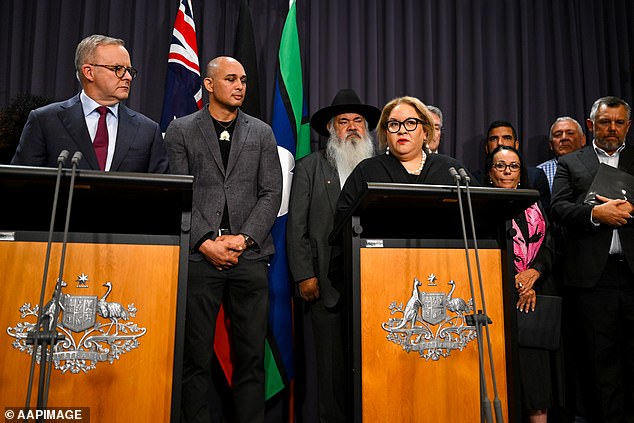The morning after Australians voted against adding a representative to parliament, constitutional lawyer Megan Davis didn’t get out of bed.
Like many other Aboriginal and Torres Strait Islander people, Professor Davis said she did not want to leave her house, get out of bed or read the news following the October referendum result.
Professor Davis has been campaigning for constitutional recognition of First Nations peoples for decades and advocated for them to have a voice in parliament in the run-up to the referendum.
Eight months after the vote, the Cobble Cobble woman said she now felt she could speak out about the referendum.
“It’s been eight months and our leaders have largely withdrawn from media and political engagement,” he said.
“As one of the leaders of that campaign, I have had a lot of time to think about the referendum and talk about it and I feel better placed to say something about it.”
On Wednesday, delivering the annual NAIDOC lecture at the University of Queensland, Professor Davis said that while the pain of the referendum would not heal quickly, Indigenous people would not give up.
“Our people have suffered much worse and we will not give up,” he said.
“No doesn’t mean the legislative voice is out of the question,” Megan Davis says of the voice referendum. She is pictured with Anthony Albanese when the voice referendum was announced.
“We turn every no into a yes.”
Professor Davis continues to campaign for the Uluru Statement from the Heart, which calls for a voice in the constitution, the treaty and in a truth-seeking process.
“They did not vote no to the truth or to negotiation,” he said.
‘No does not mean that the legislative voice is off the table and no is a no to constitutional recognition.’
Reflecting on the referendum campaign, Professor Davis said a “cocktail” of racism, politicisation of voice, misinformation, misunderstanding of the Australian constitution and fear of change led to the defeat of the “yes” vote.
“The obscurity of last year’s referendum is something the nation does not want to talk about – the thick cloud of misinformation and misunderstanding,” he said.
‘Throughout the campaign, lies were spread from both ends of the political spectrum; politicians and opportunistic bigots stepped in and colored the national conversation in ways that proved divisive.’
Encouraged by the strength of Indigenous youth and the 6.2 million people who voted “yes” in the referendum, Professor Davis said the future had the potential to be bright if all Australians worked together.
“It’s not about right and left, it’s about right foot and left foot – getting out of bed again and putting one foot in front of the other and walking alongside all Australians in a movement of the Australian people for a better future,” he said.


